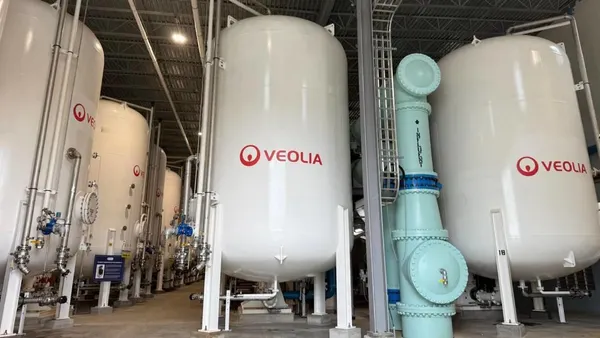Dive Brief:
- The PepsiCo Foundation has pledged $10 million to The Recycling Partnership over the next five years to launch a new "All In On Recycling" campaign. Billed as the "largest ever industrywide residential recycling challenge," the goal is to attract another $15 million in corporate investments and then catalyze $75 million from 2,800 participating communities.
- Half of the funds will go toward new carts for 550,000 households and infrastructure for multi-family buildings. The other half will be for education programs to increase participation and reduce contamination. Initial work is happening with Michigan, Central Ohio, Miami and El Paso.
- In a Fortune op-ed touting her company's use of recycled content and $55 million investment in recycling over the past 10 years, PepsiCo CEO Indra Nooyi also recognized "that these efforts are simply not enough." Groups such as Greenpeace and As You Sow, were quick to release statements about why they don't believe this latest investment is enough either.
Dive Insight:
Like other global consumer product companies, PepsiCo has become increasingly engaged in the recycling conversation due in part to mounting pressure around plastic waste. PepsiCo Recycling has been funding community and school bins with Keep America Beautiful since 2010 and the company's foundation was an initial member of the Closed Loop Fund in 2014. Last year, it joined both the New Plastics Economy initiative and The Recycling Partnership. The company has also pledged to make all of its packaging "recyclable, compostable or biodegradable," and increase the use of recycled content by 2025.
Though like other global food and beverage giants, PepsiCo also feels its collective efforts in recycling haven't been as fruitful as expected. Recycling rates for beverage containers have remained relatively flat for the past decade and companies are looking for new approaches. With controversial national extended producer responsibility discussions off the table for now, the current trend is to support recycling expansion through voluntary donations.
Now that The Recycling Partnership has become the dominant force in that nonprofit space, it is an increasingly attractive place for big-name companies to pin their hopes. This new campaign is the biggest example of that yet. Nooyi ended her Fortune piece by saying that, "I've always believed corporations do not operate in a vacuum — we have responsibilities to the communities we serve. For too long, many companies have not met those responsibilities when it comes to recycling the products we make. If other companies are willing to join us and go 'All In On Recycling,' that can change — starting today."
If this campaign is successful in its goal of capturing 7 billion containers and 1.9 million tons of recyclable material over the next five years, that will indeed be noteworthy. Greater access to clean feedstock will give companies such as PepsiCo a more reliable stream of recycled content, helping to meet their broader emissions reduction goals. Starting out with struggling areas such as Michigan, which has seen recycling rates stagnate, and El Paso, which is hoping education can forestall a contract renegotiation, is a clear way to demonstrate that value.
Yet in this moment of changing dynamics around who should pay for recycling and how to develop a coherent plan to fix it, environmental groups still want to see more from companies than donations. Greenpeace said Pepsi has "opted for blaming individuals and communities for not recycling their waste well enough" and will still profit from "cheap, momentary convenience." As You Sow said Pepsi can afford to do more and the overall campaign is skewed to expect too much money from local governments.
No matter how much big companies give, the inherent tension between reducing packaging in the first place and maintaining consumption levels while improving recycling systems won't go away any time soon.










